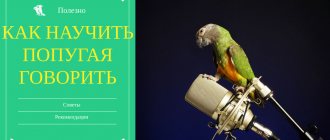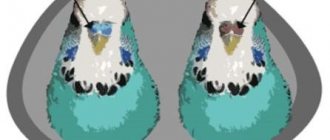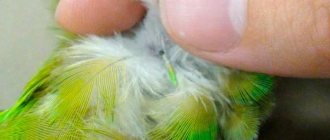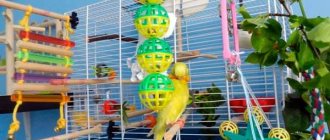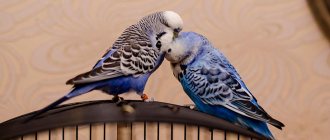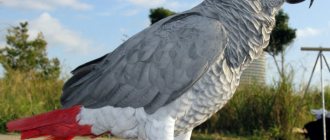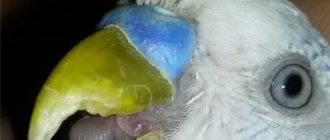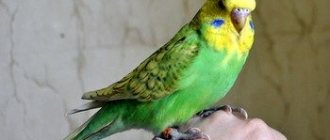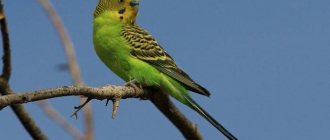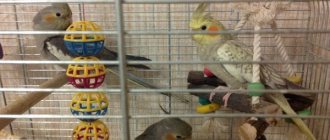Can a bird start talking at home?
Budgerigars are not the only birds in the world that can speak using human sounds and putting them into words.
At the same time, many other species of parrots can do this better and much more consciously.
However, budgerigars are the most common and suitable for home keeping, so many of their owners are concerned about the possibility of teaching the bird to talk.
If we approach this issue with all rigor, then the sounds of budgies cannot be called a conversation. This is just an imitation of what was previously heard. With the same success, parrots can imitate other sounds they like.
To teach a budgie, it is not enough that it simply hears everyday human speech, although some birds are capable of this. To achieve the result desired by the owner, the parrot needs to be dealt with purposefully.
It should be noted that feathered pets can have both different personalities and different learning abilities. Thus, if a bird is not inclined to talk, then it is almost impossible to teach it.
It is almost impossible to determine at the time of purchase whether the pet will be talkative or not. These will become clear only from the results of classes with her. At the same time, it should be noted that the gender and age of the pet indirectly influence learning abilities, which will be discussed later.
It is also useful to read: Is it necessary to cover a parrot’s cage at night?
Why do budgies like to sing and dance?
Watching budgies sing or dance is very funny. Moreover, such dances delight not only people, but also the most birds.
- Innate data. It has been proven that birds have an innate sense of rhythm. Therefore, upon hearing a piece of music, parrots often break into a dance or begin to loudly sing along to the beat of the melody. Such activities make the bird very happy, and also lift the spirits of the people watching this spectacle. But it happens that by nature, a bird is not a music lover, and you should not be surprised when it does not respond to the melodic sounds of a song.
- Imitation. Ornithologists say that in addition to their innate love of music, parrots also have good imitative abilities. After all, dancing skills usually manifest themselves in those birds that have lived in captivity for a long time and observed the behavior of people. Birds see how people behave to the music (singing along, dancing along), and then they themselves try to copy the behavior.
When training dogs, a reward method is used - for every trick they perform, they receive a treat. But budgerigars sing and dance just like that, according to their mood, and do not ask for additional payment for demonstration performances.
Video Parrot dancing
What kind of music do budgies like to listen to?
Budgerigars have no special musical preferences. The main thing for them is the feeling of rhythm in music. It is true that there are individuals who prefer classics, and some even rock, but this is more related to the preferences of their owners. What the bird hears more often, what it gets used to more, it likes more.
Budgerigars perceive dance tunes with words better. And compositions without lyrics make them depressed, indignant, and they respond loudly with disapproval.
Melodies for developing speech skills
Experts advise playing music for budgies all the time. After all, in addition to developing gaming abilities, this stimulates conversation. It has been proven that regular listening to music tracks speeds up the process of learning human speech. To benefit from music listening and teach your pet to speak, you need to follow these recommendations:
- Set a regular time for listening to music (ideally in the morning before feeding).
- Play the same excerpt of a song every day.
- Be sure to take into account the choice of the parrot (if the chick does not like the composition, he will ignore it and will not teach it).
- Create a calm atmosphere in the house, eliminate all irritants.
- Do not shout, do not get angry, do not raise your voice at the bird.
- Hold the chick in your hand.
- Praise the parrot even with small successes (give a treat if desired).
Budgerigars are very smart pets. By following the above recommendations, you can very quickly make progress in your studies from birds and hear the first phrases.
Video Parrot Richie. He speaks and sings.
When to start learning
Wanting to teach their pet to talk, many owners make the extremely serious mistake of starting to actively engage in this immediately after purchasing the bird . This is the wrong tactic.
The fact is that arriving and staying in a new home poses significant stress for a pet. Parrots need some time to adapt and get used to new living conditions. Naturally, conducting a lesson during this period is fruitless.
Is your parrot tame?
Not really
On average, the adaptation time for birds is about two weeks. However, in practice, all birds are different in their temperament and adaptive abilities. Therefore, for some, the adaptation period may end in a few days, while for others it lasts more than one month.
As for the optimal age when a bird can learn to talk, it should be understood that the younger the pet, the better learning abilities it has.
Young budgerigars aged 1 to 4 months learn best.
Does a parrot's gender affect its ability to learn to speak?
There is a fairly common belief that females are less likely to learn to speak compared to males. In this case, their lower cognitive abilities are cited as the main argument.
Of course, this is not true and females are no less capable and intelligent than males. However, female parrots actually imitate the sounds of human speech much less often.
This has a well-founded biological basis. Thus, boys are more expressive and receptive to new things, since their task is to attract females during mating games. The female is more focused on caring for her offspring.
However, persistent training with a girl parrot can also bear fruit. At the same time, in this case it is necessary to work with a pet from as early an age as possible. It has been noted that adult females, especially those who have previously bred chicks, are not inclined to imitate the sounds of human speech.
In this regard, if the owner wants to purchase a girl parrot, then she should not be older than 4 months in order to be able to teach the pet to talk.
Chatty boys and stupid girls
There is an opinion that it is impossible to teach parrot girls to talk. Actually this is not true. Both girls and boys eventually begin to talk, and the girls pronounce their words more clearly and understandably.
All parrots, regardless of gender, have the same structure of the sound apparatus, the peculiarity of which is the absence of vocal cords.
The sounds that budgies make are formed in the lower larynx, so the bird doesn’t even need to open its beak to talk; it is a natural ventriloquist. In the chest cavity there is a kind of chamber with external vocal membranes. Parrots have four sound sources - modulators, versus the usual two, which helps them successfully imitate human speech.
We recommend reading: Adapting a budgerigar's home after purchase
Males by nature are obliged to attract attention, to show themselves in all possible glory, including conversation. Females are passive, they do not need to win fans - they simply choose the best and do not bother too much about demonstrating skills. Their calling is eggs, and then chicks. Therefore, the female usually begins to speak later than the male, which became the reason for the myth about the lack of intelligence of female parrots.
You can achieve the favor of a budgerigar and reveal the conversational talent of a cute feathered friend with patience and affection. There is no need to wonder in vain: do female budgerigars talk? You need to love and train them regardless of gender, and sometimes even age.
Can an adult bird begin to pronounce words?
The lifespan of a budgerigar is about 10-12 years in captivity. Naturally, a bird can live that long if it is properly maintained. It should be noted that, according to ornithologists, birds can live approximately the same amount of time in the wild.
Budgerigars mature quite early. At one year of age, puberty begins, when the female can lay eggs. At the same time, laying eggs is possible only if there is a place for nesting, so breeding budgerigars in captivity, as a rule, does not present significant difficulties.
At the same time, young parrots actively learn new things and have good learning abilities for up to 6 months. Of course, this does not mean that older pets are not able to imitate the sounds of human speech. However, it should be understood that training adult birds may require a significantly greater commitment on the part of the owner, both in terms of time and effort expended.
Adult females with already hatched chicks are least amenable to learning to speak.
In general, it is much more difficult to teach an adult bird to speak, and therefore young birds are recommended for purchase.
Valuable tips - how to quickly train a wavy
Following the recommendations below will teach your bird to imitate a human voice.
Regularity. With any training and training, the regularity of the classes is important for achieving success. Thus, it is allowed to work with the bird every day or at least every other day if the owner is very busy. At the same time, you should not overload the bird with activities. No more than 20 minutes a day is enough. Otherwise, their effectiveness is noticeably reduced.- Proper organization of classes. During training, the bird should be completely calm, without being distracted by extraneous noises or other irritants. To do this, it is desirable that the room be as quiet as possible. The sound of a TV or radio will distract your pet, so it is best to turn them off for a while.
- Low pitch of voice . Budgerigars are more susceptible to high sound frequencies. That is why women are better at teaching a pet to talk. In addition, children also have a high timbre, so if a child shows interest in a bird, then you can entrust the activities to him. Such interaction, in addition to a good result, will also benefit the child, bringing him a lot of joy from communicating with the pet and the result obtained.
- Clear diction. Budgerigars imitate the sound they hear. That is why it is important that the owner’s diction is at a good level, as well as the pronunciation of individual sounds. If the owner speaks inarticulately, omitting certain sounds, then the bird will remember this and will reproduce exactly this variation of sound.
- Reward with a treat . Parrots do not understand and do not attach any meaning to the sounds they imitate. However, they can achieve colossal results and even speak in entire phrases and sentences. In this case, associative connections are of great importance, that is, the pet perceives the spoken sound in connection with a certain event.
Thus, good results can be achieved by rewarding each success of the bird with a treat. For a correctly pronounced sound or word, you should reward the parrot with fruit or something that he likes.
In addition, many parrot owners are interested in the question of how to train their pets in pairs. It should be noted that having a pair, the parrot may pay less attention to the owner, which will negatively affect learning. However, a parrot that is already talking can teach another bird to imitate sounds.
Thus, if there is a task to teach two young birds to talk, then this must be done separately. If one parrot can already talk, then pairing another bird with it will only contribute to its speedy learning.
It is also useful to read: Caring for a budgie at home
How to teach a parrot to pronounce sounds clearly
When training a budgerigar, you may encounter the fact that the bird speaks unclearly. The same problem exists in other species. There are two reasons for its occurrence:
- The teacher himself has unclear pronunciation. In this case, he needs to think about how to adjust his diction.
- Lack of speech practice in birds. In this situation, you need to think about how best to organize activities with your pet.
Patience and hard work by the trainer with the pet and on himself will definitely lead to a positive result.
FAQ
Next, we should look at the most frequently asked questions among owners of budgies related to the possibilities of teaching their pets to imitate the sounds of human speech.
Will the bird talk if you turn on voice recording?
Quite often on the Internet, among recommendations on how to teach a parrot to speak, you can find advice on using a voice in a recording. This may not necessarily be the voice of the owner himself. Today, there are special applications with already developed repetitions of certain words and expressions that feathered pets can learn to the greatest extent.
Undoubtedly, training with the help of voice recording is much better than irregular training or no training at all. However, you should not get too carried away with this method. If you turn on the recording too often, your pet will develop a routine attitude towards it, and he simply will not pay any attention to it.
In addition, live, direct communication with the owner regarding the result and the organization of the process itself is much better perceived by the bird.
What words does the wavy remember better?
The anatomy of parrots is, for obvious reasons, significantly different from that of humans. Therefore, the reproduction of sounds by a bird is carried out by completely different mechanisms. In this regard, parrots perceive words with a large number of hissing words well, as well as with the sound “r”.
The words themselves should be small, short, mostly two-syllable. After your pet learns to pronounce simple words, you can move on to learning phrases.
How many words can he learn?
The number of words that a parrot can reproduce is large enough to make logical sentences out of them. However, the concept of “logic” cannot be fully applied to the sounds made by a bird.
Sometimes feathered pets use words at random, uttering completely meaningless phrases. This does not mean that the parrot will not pronounce the correct phrases if you study them not at the level of individual words, but their combinations.
On average, a budgerigar's vocabulary can be several dozen words (about 30-40).
Can you forget all the words
Many parrot owners notice that over time their pets reproduce the sounds of the human voice less and less, gradually forgetting all previously learned words. Many see the reason for this in the maturation of the bird. However, it's not a matter of age.
Indeed, budgies may stop talking, but this happens if the owner stops working with his pet . Thus, in order for the parrot to please the owner with its conversation, you need to regularly train this skill.
In the absence of practice, the bird will forget all the words that it had previously learned. At the same time, it should be noted that teaching an adult bird that has lost the corresponding skill to imitate the sounds of a human voice is much more difficult than a young bird that has not previously spoken at all. This is especially true for females who have previously bred offspring.
Why does a parrot make loud noises?
Breeders should be wary of the frequent loud sounds that wavy pets begin to make. Usually noise among birds arises when there is possible danger, or when they feel discomfort. This often happens when the birds have just been acquired and they are getting used to the new room, or when the owner does not pay attention to them. The banal absence of a partner can also cause the bird to become restless and scream. To find out the true cause of the night screaming, you need to analyze the behavior of the birds, and also take into account all possible factors that could lead to this condition.
- The parrot screams and runs around the cage
This happens when the bird has an excess of energy due to lack of physical activity. If the parrot is not allowed to fly much, and there is also a small cage, then naturally the feathered pet will begin to be indignant. But this can also be observed when changing the usual diet, during the mating season, or during stress (for example, loss of a mate).
- Scream at dawn
At dawn, both domestic budgerigars and their wild relatives begin the time for vocal activity. In this situation, screaming is a variant of the norm for birds. They are healthy, cheerful, ready for new adventures. The morning cry of parrots is comparable to the crowing of roosters, and marks the beginning of a new day. Smart birds want to tell people: “Good morning! Climb!".
- Screams at night
Usually budgies are passive at night - they rest and sleep. The loud squeaking of chicks in the middle of the night should alert you. This happens if the birds are feeling unwell, acute pain, or something has caused them severe fright (loud sound, harsh light, the appearance of a cat near the cage).
How to Avoid Noisy Parrot Behavior
Usually, budgies are quiet, and their cute chirping only enlivens the situation. If the birds begin to scream all day long, creating unimaginable noise from morning to night, then you need to deal with possible provoking factors and eliminate them as much as possible:
- Create the most comfortable living conditions.
- Protect birds from possible sources of disturbance.
- Review your pets' diet.
- Analyze the dimensions of the cage and, if possible, organize a more spacious enclosure.
- Let the parrots fly around the apartment.
- When keeping a single pet, spend a lot of time communicating with your pet, or buy him a pair.
- Contact a veterinarian if you suspect an illness.
- Undergo veterinary preventive examinations on time.

